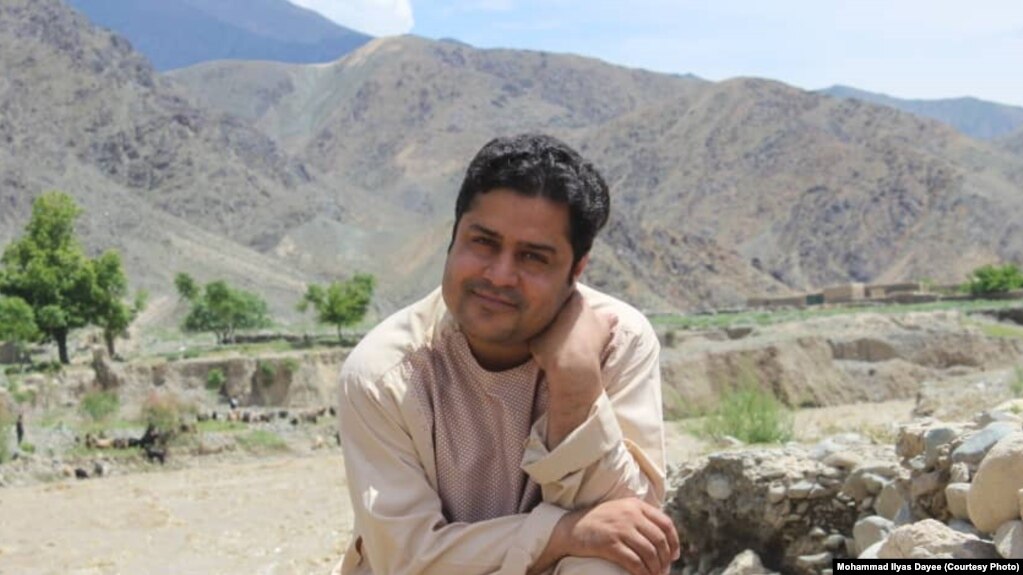RFE/RL Marks One Year Since Murder Of Radio Azadi Journalist In Afghanistan
RFE/RL honors the memory of RFE/RL Afghan Service senior correspondent Mohammad Ilyas Dayee.

WASHINGTON – RFE/RL honors the memory of RFE/RL Afghan Service senior correspondent Mohammad Ilyas Dayee, who was killed one year ago today in a targeted car bombing near his home in Lashkar Gah, the capital of Afghanistan’s southern Helmand Province, as well as the sacrifices of Dayee’s Afghan Service colleagues in the tumultuous year that has passed since he was assassinated.
RFE/RL President Jamie Fly said, “Mohammad Ilyas Dayee’s death both presaged the tragic events of this past summer, when everything changed in Afghanistan, and directed a harsh spotlight on the professional and human toll that became a daily reality for all journalists in the country. Dayee was a hero of his chosen profession and remains a model of excellence for RFE/RL as we re-establish our reporting presence in exile, outside of Taliban-ruled Afghanistan.”
Dayee, 33, who had been associated with RFE/RL since 2008, regularly reported on the dangerous security situation in Helmand and its impact on civilians in his native province. Dayee also gave Radio Azadi, as the Afghan Service is known locally, some of its most incisive reports on the drug trade in Helmand—the source for most of the world’s illicit opium production.
Dayee is one of several RFE/RL journalists to be killed in Afghanistan since the organization resumed broadcasting in the country in January 2002. Three Radio Free Afghanistan journalists – Sabawoon Kakar, Abadullah Hananzai, and Maharram Durrani – died in April 2018 in a bombing attack in Kabul that killed at least 25 people, including 9 journalists.
Other RFE/RL journalists in Afghanistan have regularly endured death threats and other forms of harassment, from both Taliban and Islamic State forces.
The first anniversary of Mr. Dayee’s brutal murder comes against the backdrop of the withdrawal of U.S. forces from Afghanistan and subsequent takeover of the country by the Taliban. Since the Taliban returned to power, the twenty-year expansion of free media in Afghanistan has come to a sudden end, with numerous media freedom and human rights groups decrying attacks on journalists and restrictive journalism rules that have driven women out of the profession.
Said Fly, “Dayee paid the ultimate price for his and Radio Azadi’s journalism, but recent months have shown that he was not by any means the only journalist threatened by extremist forces in Afghanistan. We appreciate the support that Afghan journalists have received from the U.S. and other governments, but more needs to be done accelerate the safe passage of vulnerable media professionals who want to leave the country.”
The changing reality of producing journalism in Afghanistan has also forced RFE/RL to take dramatic steps to protect its staff, including the closure of its Kabul bureau, and evacuation of threatened local journalists from the country.
RFE/RL’s efforts to protect its staff has not lessened its commitment to serving its Dari- and Pashto-speaking audiences in Afghanistan. RFE/RL is establishing a new reporting hub, to provide a safe environment for journalists who formerly worked in Radio Azadi’s Kabul Bureau to continue their reporting activity outside of Afghanistan.
The Service also continues to produce impactful reporting from inside Afghanistan. A new call-in program, “Giving Voice To Afghan School Girls,” provides a space for female students banned from attending school by the Taliban to share their thoughts and opinions. On another call-in show, Afghan listeners challenged a Taliban spokesman, contradicting the spokesman’s claim that the Taliban was distributing aid fairly to those who need it most. And Radio Azadi journalists continue to stay in touch with their local sources and produce breaking news stories on topics such as the expiration of 1.6 million doses of COVID-19 vaccine as the Taliban prioritized other surging humanitarian crises; farmers devastated by war, drought, and COVID complaining that the Taliban is now imposing charity taxes under Islamic law; and the country’s economic collapse as seen through the experience of day laborers and displaced people in southwestern Afghanistan.
For more information, contact press@rferl.org.
###
About RFE/RL
Radio Free Europe/Radio Liberty (RFE/RL) is a private, independent international news organization whose programs — radio, Internet, television, and mobile — reach influential audiences in 23 countries, including Russia, Ukraine, Iran, Afghanistan, Pakistan, the republics of Central Asia and the Caucasus. It is funded by the U.S. Congress through USAGM.